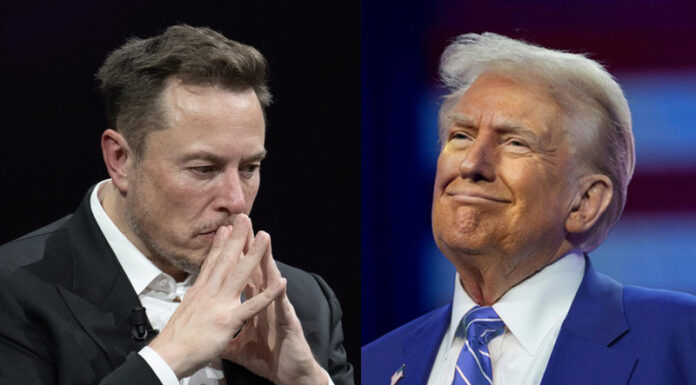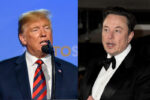Elon Musk, the billionaire entrepreneur, attempted to continue his involvement with the Trump administration’s cost-reduction initiative but was turned down by White House officials, according to two sources familiar with the situation. This decision came before Musk’s abrupt exit from his position as head of the Department of Government Efficiency (DOGE).
Musk’s role as a “special government employee” restricted his government work to 130 days annually. Despite his desire to keep working towards reducing federal spending, his request was denied, sources told The Telegraph. Musk, CEO of Tesla and SpaceX, announced his departure on May 28 via X, expressing gratitude to President Donald Trump for the chance to address government spending.
His exit followed a day after he criticized Trump’s spending bill as a “disgusting abomination,” causing tension with Republican lawmakers trying to gain support for the large legislative package.
According to Reuters, Musk’s departure was swift and lacked a formal discussion with Trump. The decision was made by senior staff, not by the president. Several senior DOGE officials are also leaving, including top attorney James Burnham and longtime Musk associate Steve Davis.
In a farewell at the Oval Office, Trump commended Musk, stating, “He stepped forward to put his very great talents into the service of our nation, and we appreciate it.” Trump added, “And I just want to say that Elon has worked tirelessly, helping lead the most sweeping and consequential government reform program in generations,” during the ceremonial send-off.
DOGE claimed to have saved $175 billion through measures like contract cancellations, asset sales, and workforce reductions. This figure is a portion of Musk’s initial $2 trillion goal, later adjusted to $1 trillion. Various news outlets have questioned the accuracy of these savings and the methods used for calculation.
The Washington Post’s analysis found that DOGE had overstated savings, including contracts that were already completed and paid. The agency reduced the listed savings by $9.3 billion after the analysis was published. The Partnership for Public Service estimated DOGE’s actions could cost taxpayers $135 billion this fiscal year due to expenses related to placing employees on paid leave, rehiring mistakenly terminated workers, and lost productivity across government agencies.
Several factors contributed to Musk’s contentious exit, beyond his request to extend his role. The administration’s spending bill removed electric vehicle tax credits benefiting Tesla. Musk also failed in persuading the Federal Aviation Administration to adopt his Starlink satellites for air traffic control, and the White House withdrew the nomination of Jared Isaacman, a close ally, to head NASA.
Deputy Chief of Staff Stephen Miller and other senior aides were notably upset by Musk’s public criticism of Trump’s legislative priorities. In a CBS interview after his departure announcement, Musk expressed disappointment with the spending bill, stating it “increases the budget deficit, not just decreases it, and undermines the work that the DOGE team is doing.”
Trump and DOGE succeeded in reducing nearly 12 percent of the federal civilian workforce—around 572,000 positions—mainly through termination threats, buyout offers, and early retirement packages. The U.S. Agency for International Development experienced severe cuts, eliminating 83 percent of its programs and 5,200 contracts following a six-week DOGE review.
The efficiency initiative faced significant legal challenges during Musk’s tenure. Fourteen states filed lawsuits claiming Musk wielded unchecked and unconstitutional authority over federal operations. Federal courts repeatedly challenged and, in some cases, reversed workforce cuts and agency eliminations implemented by the DOGE team.
Musk acknowledged the challenges he faced in reforming federal operations. He told The Washington Post that the federal bureaucracy was much worse than he realized, describing his efforts as an uphill battle to improve things in Washington.
Public opinion also turned against Musk during his government service. A Washington Post-ABC News-Ipsos poll found 57 percent of Americans disapprove of how Musk handled his responsibilities in the Trump administration. His political activities led to nationwide protests, vandalism at Tesla dealerships, and a significant decline in the company’s stock price and vehicle sales during his government involvement.
Musk had previously indicated plans to reduce his government work starting in May, telling investors during Tesla’s first-quarter earnings call that he would limit his DOGE involvement to one or two days per week for the rest of Trump’s term. He also announced plans to significantly reduce his political spending after contributing over $290 million to support Trump and other Republican candidates.
Despite leaving formal government service, Musk is expected to maintain an informal advisory role with the Trump administration. The DOGE initiative will continue with remaining staff embedded across federal agencies, with its mandate extending through July 4, 2026. House Republicans are preparing to introduce rescissions legislation that would formalize many of the cuts initiated during Musk’s controversial tenure.








